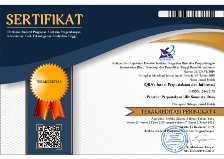Analisis Bibliometrik Perkembangan Penelitian Preservasi Pengetahuan Di Indonesia
Abstract
This research examines the development of research trends regarding knowledge preservation in Indonesia. The research aims to determine: (1) the development of the number of international publications regarding knowledge preservation in Indonesia in the Scopus database in 2012-2022, (2) the core journal, (3) the contribution of research institutions, (4) researcher productivity, (5) a development map based on subjects or fields, (6) keywords (co-words), and (7) authors (co-authors). Data collection was carried out using the keywords "preservation", "knowledge", and "Indonesia" in "categories, article titles, abstracts, and keywords" in the 2012-2022 time period. The data were analyzed using Microsoft Excel and VosViewer. The research results showed that 467 articles were published in 2012-2022. There are 91 articles (19.49%) published in 2022, and this is the largest number of publications. IOP Conference Series Earth & Environmental Science is a core journal that publishes 39 publications (8.35%). The University of Indonesia is the most contributing institution, and Iskandar, J., is the most prolific writer, publishing six publications (1.28%). Social sciences are the subject or field with the most publications (34.68%). Based on keyword mapping (co-words), there are 9 groups, while based on authors (co-authors), there are 4 clusters. There is also a development trend that is increasing every year.
Keywords
Full Text:
PDF (Indonesian)References
Boyle, F., & Sherman, D. (2008). Scopus™: The product and its development. The Serials Librarian, 49(3), 147-153. DOI: https://doi.org/10.1300/J123v49n03_12
Burnham, J. F. (2006). Scopus database: a review. Biomedical digital libraries, 3(1), 1-8. DOI: https://doi.org/10.1186/1742-5581-3-1
Chen, X., et., al. (2016). Mapping the research trends by co-word analysis based on keywords from funded project. Procedia computer science, 91, 547-555. DOI: https://doi.org/10.1016/j.procs.2016.07.140
Cobo et al., (2011). An approach for detecting, quantifying, and visualizing the evolution of a research field: A practical application to the Fuzzy Sets Theory field. Journal of Informetrics, 5 (1) (2011), pp. 146-166. DOI: https://doi.org/10.1016/j.joi.2010.10.002
Donthu, N., et., al. (2021). How to conduct a bibliometric analysis: An overview and guidelines. Journal of Business Research, 133, 285-296. DOI: https://doi.org/10.1016/j.jbusres.2021.04.070
Farida, N. & Firmansyah, A., H. (2020). Analisis bibliometrik berdasarkan pendekatan Co-word: Kecenderungan penelitian bidang kearsipan pada Jurnal Khazanah dan Journal of Archive and Record tahun 2016-2019. Khazanah: Jurnal Pengembangan Kearsipan, 13(2), 91-109. DOI: https://doi.org/10.22146/khazanah.55690
Guz, A. N., & Rushchitsky, J. J. (2009). Scopus: A system for the evaluation of scientific journals. International Applied Mechanics, 45(4), 351-362. DOI: https://doi.org/10.1007/s10778-009-0189-4
Harimurti, W. R., & Emdrawati, S. (2019). Ada Apa dengan Konservasi, Preservasi, dan Restorasi? [Online] Diakses pada: https://kebudayaan.kemdikbud.go.id/bpcbyogyakarta/ada-apa-dengan-konservasi-preservasi-dan-restorasi-seri-konservasi-bagian-1/
Makmur, T., Suadi, D., & Samsudin, D. (2021). Kajian Preservasi di Indonesia. UNILIB: Jurnal Perpustakaan, 12 (1), 54 - 69. DOI: https://doi.org/10.20885/unilib.vol12.iss1.art6
Moral-Muñoz, José A., et., al. (2020). "Software tools for conducting bibliometric analysis in science: An up-to-date review". El profesional de la información, v. 29, n. 1, e290103. DOI: https://doi.org/10.3145/epi.2020.ene.03
Nawangsari, A. T., Junjunan, M. I., & Mulyono, R. D. A. P. (2020). Sustainability Reporting: Sebuah Analisis Bibliometrik pada Database Scopus. Journal of Applied Accounting and Taxation, 5(2), 137-157. DOI: https://doi.org/10.30871/jaat.v5i2.2182
Persson, O., Danell, R., & Schneider, J. W. (2009). How to use Bibexcel for various types of bibliometric analysis. Celebrating scholarly communication studies: A Festschrift for Olle Persson at his 60th Birthday, 5, 9-24. [Online] Diakses pada: http://urn.kb.se/resolve?urn=urn:nbn:se:umu:diva-25636
Pranckutė, R. (2021). Web of Science (WoS) and Scopus: The titans of bibliographic information in today's academic world. Publications, 9(1), 12. DOI: https://doi.org/10.3390/publications9010012
Rahayu, E. S. R., & Rusmiyati, E. (2018). Analisis Bibliometrik Perkembangan Penelitian Bidang Ilmu Instrumentasi. Jurnal Dokumentasi dan Informasi, 39(2), 135-149. DOI: https://doi.org/10.14203/j.baca.v39i2.413
Sulardja, E. C. (2021). Analisis bibliometrik publikasi ilmiah bidang digital asset management berbasis data Scopus 2011-2020. Informatio: Journal of Library and Information Science, 1(3), 259-280. DOI : https://doi.org/10.24198/inf.v1i3.35339
Van Eck, N. J., & Waltman, L. (2011). Text mining and visualization using VOSviewer. arXiv preprint arXiv:1109.2058. DOI: https://doi.org/10.48550/arXiv.1109.2058
Zagzebski, L. (2017). What is knowledge?. The Blackwell guide to epistemology, 92-116. DOI: https://doi.org/10.1002/9781405164863.biblio
DOI: http://dx.doi.org/10.30829/iqra.v17i2.17366
Refbacks
Copyright (c) 2023 Euis Sri Nurhayati, Tamara Adriani Salim

This work is licensed under a Creative Commons Attribution-ShareAlike 4.0 International License.
IQRA': JURNAL PERPUSTAKAAN DAN INFORMASI
Perpustakaan Universitas Islam Negeri Sumatera Utara
Jalan Willem Iskandar Pasar V Medan Estate
20371
Medan - Sumatera Utara






